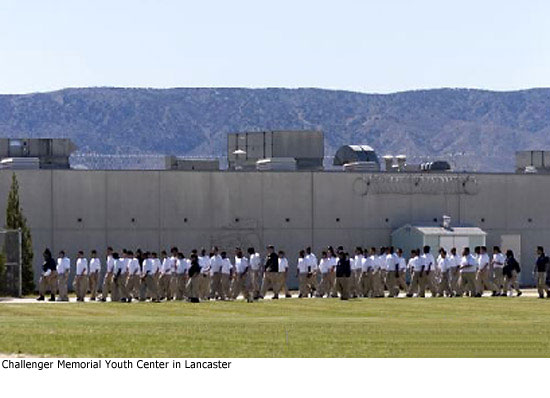Fresh start for failed youth camp school
November 4, 2010
Less than a year after a class action lawsuit alleged a near-total breakdown in the school system at the county’s largest juvenile detention camp, the Board of Supervisors has approved a far-reaching settlement that will overhaul educational services at the Challenger Memorial Youth Center in Lancaster.
Under the agreement negotiated with a coalition of civil rights groups and approved Wednesday, the complex of six probation camps colloquially known as “Camp Challenger” will have up to a year to vastly upgrade an educational system that has been beset for several years by accusations of incompetence and disregard.
Among other things, the camp, which is required by law to provide schooling to some 650 students, will be forced to hire reading specialists and create vocational and literacy programs for its charges, many of whom arrive with reading skills that are several years behind grade level. Also among the mandates are improvements in access to books and workspaces, a designated classroom for kids in the facility’s special handling unit, an updated security system and improved monitoring of teacher absences.
A panel of nationally-known educational experts will develop and monitor the reforms at the institution. Intensive tutoring also will be made available to students who were at Challenger after 2008, the parties said.
“Los Angeles is going to be a national model,” said Mark Rosenbaum, chief counsel of the ACLU of Southern California, which brought the class action along with Public Counsel and the Disability Rights Legal Center on behalf of three youths who had been held at Challenger as minors.
“While we do not acknowledge that all the allegations are true, we did recognize there were some serious problems and this lawsuit brought it to everyone’s attention,” agreed Assistant County Counsel Roger Granbo, who negotiated on behalf of the county. “There’s going to be a complete culture change out at Challenger.”
The suit, filed in January against the probation department and the Los Angeles County Office of Education, had depicted educational negligence at Challenger in epic proportions—a years-long situation in which teachers were routinely AWOL, kids lacked textbooks, pleas for educational help were ignored or punished and at least one teenager who had been at Challenger for most of his adolescence was awarded a diploma, even though he was illiterate.
One teenager allegedly spent months in a solitary cell with no schooling except for occasional meetings with a teacher who sometimes left after as little as 15 minutes. Classwork, the suit claimed, consisted of occasional worksheets thrown under the cell door. Another said he was denied special instruction even though, at 17, he had the reading comprehension of a second grader and had repeatedly told his teachers he didn’t understand the classwork.
The suit alleged that students were so illiterate that they could not complete job applications or read restaurant menus. “These kids were regarded as disposable people,” Rosenbaum says.
Situated in the desert next to a prison, the Challenger complex has suffered from its remote location, as well as architecture that imparts a forbidding, prison-like atmosphere, even without the punitive culture and hostility that have plagued it in recent years, educational experts say. Allegations of mistreated teenagers there made it the target of a Department of Justice investigation, and a 2009 Los Angeles County Probation Commission report called its school system “broken.”
However, both sides said, the settlement promises to address longstanding concerns in and outside the probation system, and retirements and resignations in recent months have turned over leadership at both the county probation department and the office of education.
“Already we’re seeing changes at Challenger,” said Cal Remington, chief deputy of the probation department. “There’s a new principal I have a lot of confidence in, and he’s already making a difference. And we’ve already brought in some experienced teachers from other institutions.”
Rosenbaum praised the county for seizing on the lawsuit as an opportunity to push for more change. “This was a cooperative venture from the beginning — all the energy was toward finding a solution for the kids,” he said.
And experts in the rehabilitation of juvenile offenders said that even at an institution like Challenger, teachers and programs can make a difference.
“You can blame the kids, you can blame the architecture, you can say the place is in the desert far from home,” said University of Maryland education professor Peter Leone.
“But I’ve seen some correctional settings that were really unappealing and they have some terrific programs. Look, we’re the adults in this situation. If we teach kids begrudgingly and don’t inspire within them the spark of learning, we have no one to blame but ourselves.”
Although the county and the ACLU have agreed to the settlement, it will not be finalized until the court signs off.
Posted 11/4/10













 405 bridge work causes a stink
405 bridge work causes a stink
